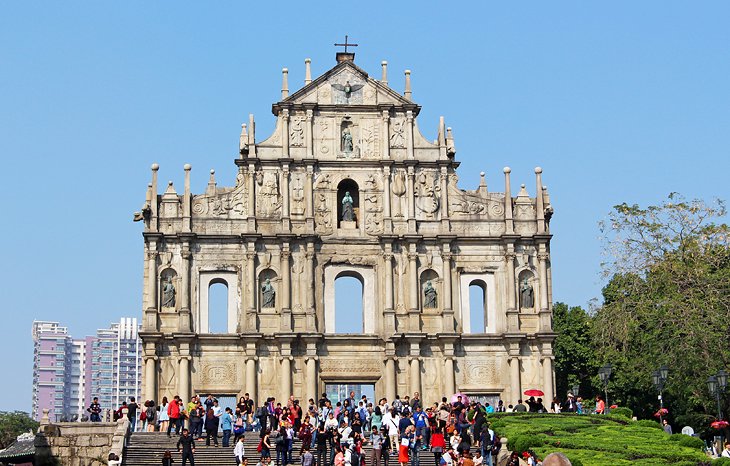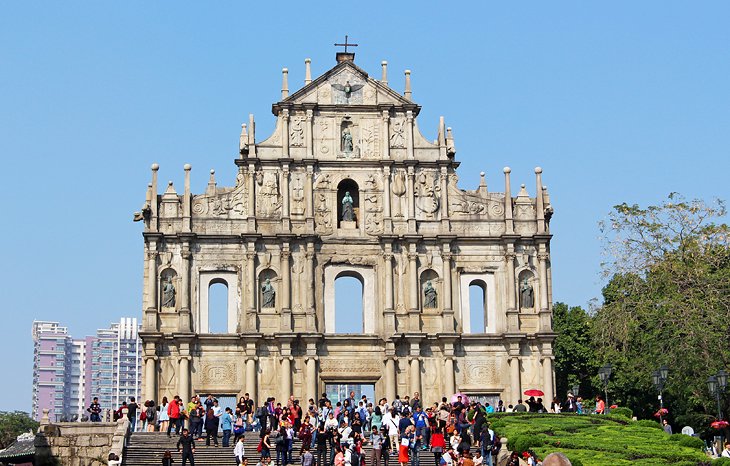
Macau, a Special Administrative Region of China, is a destination that defies simple categorization. For centuries, it was a Portuguese colony, and this rich heritage is interwoven with its vibrant Chinese culture, creating a unique tapestry of experiences. From glittering casinos and opulent resorts to ancient temples and colonial architecture, Macau offers a captivating blend that appeals to every traveler. Beyond its famous gambling scene, this compact peninsula and its surrounding islands are brimming with history, culinary delights, and a surprisingly diverse array of attractions.
A Glimpse into Macau’s Storied Past:
Macau’s history is as fascinating as its present. Established as a Portuguese trading post in the mid-16th century, it became the first and last European colony in China, serving as a crucial bridge between East and West for over 400 years. This extended period of foreign influence has left an indelible mark on its architecture, cuisine, and way of life. The Portuguese brought with them their language, religion, and architectural styles, which are still evident today in its charming cobbled streets and magnificent churches. Simultaneously, the enduring Chinese traditions of its native population have been preserved and celebrated, creating a harmonious cultural fusion.

Related Articles about Macau: Where East Meets West in a Symphony of Sights, Sounds, and Flavors:
- Lima’s Luminous Stays: Unveiling the City’s Best Hotels Amidst a Tapestry of History and Flavor
- Chile: A Tapestry of Wonders – From Atacama’s Desolation to Patagonia’s Majesty
- Vietnam: A Tapestry of Timeless Wonders
- Kenya: Where Wildlife Roams Free and History Whispers Through the Savannah
- Japan: A Tapestry of Tradition and Tomorrow – Your Ultimate Guide to Exploration
In 1999, Macau was handed back to China, becoming a Special Administrative Region with a high degree of autonomy under the "one country, two systems" principle. This transition has further shaped its identity, allowing it to maintain its distinct cultural heritage while embracing its role as a global hub for tourism and entertainment.
Unveiling Macau’s Top Attractions:
Macau’s allure lies in its diverse offerings, catering to a wide spectrum of interests. Here are some of the absolute must-sees:
-
The Historic Centre of Macau (UNESCO World Heritage Site): This is the heart and soul of Macau’s historical significance. Wandering through its narrow lanes is like stepping back in time. Key highlights include:
- Ruins of St. Paul’s: The iconic façade of this 17th-century church, with its intricate carvings and steps leading to nowhere, is Macau’s most recognizable landmark. It’s a poignant reminder of the city’s colonial past and a photographer’s dream.
- Senado Square: A vibrant pedestrianized plaza adorned with Portuguese-style mosaic pavements. Surrounded by neoclassical buildings, it’s a bustling hub for locals and tourists alike, often hosting cultural events.
- A-Ma Temple: Dedicated to the Chinese goddess of the sea, Mazu, this ancient temple predates Portuguese settlement and is considered the birthplace of Macau. Its serene atmosphere and traditional architecture offer a glimpse into local beliefs.
- Mount Fortress: Perched atop a hill, this historic fortress offers panoramic views of the city and the Pearl River Delta. It once served as a vital defense against pirates and invaders.
- St. Dominic’s Church: A beautiful Baroque church with a striking yellow exterior, dating back to the late 16th century. Its interior is equally impressive, with ornate altars and religious art.
- Lilau Square: A charming, tree-lined square that was once the hub of the Portuguese community. It exudes a tranquil, old-world charm.

-
The Venetian Macao: A colossal resort that embodies Macau’s modern glitz and glamour. Inspired by Venice, it features a sprawling indoor canal system with gondolas, complete with singing gondoliers. Beyond the canals, it boasts an immense casino, a vast shopping mall with luxury brands, and numerous dining options. It’s an experience in itself, offering a taste of extravagant entertainment.
-
The Parisian Macao: Another extravagant resort, this one paying homage to the City of Love. Its most striking feature is a half-scale replica of the Eiffel Tower, offering breathtaking views of the Cotai Strip, especially at night when it’s illuminated. Inside, you’ll find Parisian-themed shops, restaurants, and a casino.
-
City of Dreams: A dynamic integrated resort that offers a diverse range of entertainment, including world-class shows like "The House of Dancing Water" (a spectacular water-based performance), a vast casino, high-end shopping, and a variety of dining establishments.
-
Wynn Palace: Known for its opulence and artistic flair, Wynn Palace features the mesmerizing "Performance Lake" with its synchronized fountain shows, the SkyCab gondola ride offering aerial views of the resort, and an extensive collection of fine art.
-
Macau Tower Convention and Entertainment Centre: For thrill-seekers, this is the place to be. The Macau Tower offers a range of adrenaline-pumping activities, including bungy jumping from the world’s highest commercial bungy jump, skywalks, and a thrilling zipline. It also provides stunning panoramic views of Macau.
-
Taipa Village: A charming and picturesque district that offers a more relaxed and authentic Macau experience. Its narrow streets are lined with traditional Portuguese houses, quaint cafes, boutique shops, and a variety of local eateries serving delicious Macanese cuisine. It’s a delightful place to wander and soak in the local atmosphere.
-
Coloane Village: The southernmost and most tranquil part of Macau, Coloane Village is a haven of peace and natural beauty. It’s famous for its colorful houses, the historic Chapel of St. Francis Xavier, and the iconic Lord Stow’s Bakery, where the original Portuguese egg tarts were created. The nearby Hac Sa Beach offers a relaxing escape from the city’s hustle and bustle.
Navigating Macau: Travel Tips for a Seamless Experience:
Macau is a compact destination, making it relatively easy to explore. Here are some essential travel tips:
- Visa Requirements: Depending on your nationality, you may require a visa to enter Macau. It’s crucial to check the latest visa regulations with the Macao Immigration Services or your local embassy well in advance of your trip.
- Currency: The official currency is the Macanese Pataca (MOP). However, Hong Kong Dollars (HKD) are widely accepted throughout Macau, often at a 1:1 exchange rate. It’s advisable to carry some MOP for smaller purchases.
- Language: The official languages are Portuguese and Chinese. However, English is widely spoken in tourist areas, hotels, and casinos.
- Connectivity: Wi-Fi is readily available in most hotels, casinos, and public areas. You can also purchase local SIM cards for mobile data.
- Tipping: Tipping is not generally expected in Macau, though some upscale restaurants may include a service charge on the bill.
- Respect Local Customs: While Macau is a melting pot of cultures, it’s always respectful to be mindful of local customs. Dress modestly when visiting temples and religious sites.
- Hydration: Macau can be humid, especially during the summer months. Stay hydrated by drinking plenty of water.
- Sun Protection: Pack sunscreen, a hat, and sunglasses, as the sun can be quite strong.
- Comfortable Footwear: You’ll be doing a lot of walking, especially in the Historic Centre, so comfortable shoes are a must.
Accommodation Options: From Opulent Resorts to Boutique Charm:
Macau offers a wide range of accommodation to suit every budget and preference.
- Luxury Resorts: The Cotai Strip is home to an array of world-class integrated resorts, including The Venetian, The Parisian, City of Dreams, and Wynn Palace. These properties offer lavish rooms, unparalleled amenities, casinos, fine dining, and entertainment.
- Mid-Range Hotels: You’ll find numerous well-appointed hotels in the city center and on Taipa, offering comfortable stays with good facilities at more accessible price points.
- Boutique Hotels and Guesthouses: For a more intimate and unique experience, consider the charming boutique hotels and guesthouses scattered throughout the Historic Centre and Taipa Village. These often showcase colonial architecture and offer a more personalized touch.
- Budget-Friendly Options: While Macau is known for its luxury, budget travelers can still find hostels and guesthouses, particularly in less touristy areas.
Getting Around Macau: Efficient and Diverse Transportation:
Macau’s compact size makes transportation a breeze.
- Free Shuttle Buses: Most of the major integrated resorts and casinos operate free shuttle buses that connect their properties to key locations like ferry terminals, border crossings, and the airport. This is an excellent way to get around and save money.
- Taxis: Taxis are readily available and are a convenient option for direct travel. Ensure the meter is used.
- Public Buses: An extensive network of public buses serves Macau and its islands. They are affordable and a great way to experience local life. However, understanding routes can be a bit challenging for first-time visitors.
- Trams: While not as extensive as buses, there are still a few tram lines operating in Macau, offering a nostalgic way to see some of the city.
- Walking: For exploring the Historic Centre and Taipa Village, walking is the best way to discover hidden gems and soak in the atmosphere.
- Ferry: Ferries connect Macau to Hong Kong and other cities in mainland China, arriving at the Macau Outer Harbour Ferry Terminal or the Taipa Ferry Terminal.
The Best Time to Visit Macau:
Macau experiences a subtropical climate with distinct seasons. The best times to visit are:
- Autumn (October to December): This is arguably the most pleasant time to visit. The weather is mild and dry, with comfortable temperatures, making it ideal for sightseeing and outdoor activities.
- Spring (March to May): Spring offers pleasant temperatures and blooming flowers. However, it can be a bit humid, and there’s a chance of occasional rain showers.
- Winter (January to February): While cooler, winter is generally dry and sunny. It’s a good time for those who prefer slightly cooler weather and fewer crowds.
- Summer (June to September): This is the hottest and most humid period, with a high chance of typhoons. While there are more indoor activities available, outdoor exploration can be challenging.
Beyond the Glitter: A Culinary Journey:
Macau’s culinary scene is a testament to its rich cultural fusion. Macanese cuisine is a unique blend of Portuguese and Chinese flavors, with influences from Southeast Asia and Africa. Don’t leave without trying:
- Portuguese Egg Tarts: The iconic pastry, crispy on the outside and creamy on the inside. Lord Stow’s Bakery in Coloane is a must-visit.
- African Chicken: A flavorful dish featuring chicken cooked in a rich sauce of chili, coconut milk, peanuts, and spices.
- Minchi: A comforting dish of minced meat (beef or pork) stir-fried with potatoes, onions, and often served with a fried egg on top.
- Bacalhau: Salted codfish prepared in various ways, a staple of Portuguese cuisine.
- Galinha à Africana: Another Portuguese-influenced chicken dish, often with spices and olives.
- Dim Sum: Enjoy authentic Cantonese dim sum in many of Macau’s Chinese restaurants.
Conclusion:
Macau is a destination that offers a captivating journey through history, culture, and modern entertainment. From the UNESCO-listed Historic Centre that whispers tales of its colonial past to the dazzling resorts that showcase its contemporary dynamism, Macau promises an unforgettable experience. Whether you’re a history buff, a foodie, a thrill-seeker, or simply looking for a vibrant escape, this unique corner of the world will undoubtedly leave you enchanted. So pack your bags, embrace the blend of East and West, and prepare to be amazed by the multifaceted charm of Macau.





